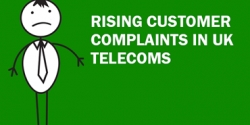Dealing with negative comments on social media
Published on: February 23, 2012
Social media gives every one of your customers a voice that can be heard across the internet, outside your control. While this can worry many companies, it is worth realising that not every comment that people make on Facebook or Twitter is going to be negative – and also that those that have suffered a bad experience can change their mind if they are treated properly.
US research found that 68% of those that posted a complaint or a negative comment on social media got a response from the retailer. Emphasising the importance of engaging with customers, 18% of those actually turned into loyal customers and bought even more. A third (33%) then posted a positive review and 34% actually deleted their original, negative comment or review.
This really demonstrates how addressing customer issues can help turn around a negative experience and create a brand advocate. The first thing you need to be doing on social media is actually engaging with customers, rather than running away from complaints or poor feedback.
So what is the best way to deal with negative feedback on social media? Here are some tips from our own experience and the blog of Aaron Lee:
1 Speed is of the essence
Customers expect a fast response, normally within an hour. This requires a comprehensive monitoring system that alerts the customer service team about comments mentioning your company or products quickly so that they can provide a fast answer and prevent the customer getting angrier.
2 Be human and be honest
Companies need to be consistent in how they respond to complaints – otherwise you risk creating inequalities between other channels such as phone or email. However agents need to respond sympathetically and honestly and apologise where necessary.
3 Don’t take it personally
When a customer complains, don’t take it personally. If they’re angry, getting angry yourself is only going to make things worse – and behaviour such as removing negative Facebook comments will enflame the situation and potentially damage your entire brand. Be polite, apologetic where necessary and use non-confrontational language.
4 Provide real answers
There is no point in responding in seconds if you don’t answer the question or issue that the customer has raised. If necessary acknowledge the complaint, show you are looking into it and then come back within a stated timeframe, rather than just issuing an empty apology. Link social media customer service to your central knowledgebase, so you can call on the widest possible range of answers to customer questions.
5 Integrate social media into customer service
Many companies still deal with social media comments separately to other customer service channels. This risks creating an expensive silo, with inconsistent answers being given to customers. Use workflow to ensure that social media is treated as one of multiple customer contact channels. You need to have the ability to share information and provide a joined up service that enables consumers to cross channels with all the details of their complaint immediately visible to the agent speaking to them.
Ignoring negative comments won’t make them go away. However deal with them well and you are essentially giving your company a second chance with a customer, enabling you to turn them into an enthusiastic brand advocate.
Categories: Customer Service, Multichannel Customer Service







Comments